CASL Faculty Research Events











2024 CASL Faculty Research Celebration
Our faculty research event was a symposium of combined works, where faculty members shared their contributions to our college, campus, and communities in multiple formats. These included 5 minute lightning talks, 2 minute elevator pitches, tables to house books, publications, and physical research artifacts, a wall of research posters, and the opportunity to share a photo/tweet for our slideshow.
Elevator Pitch & Lightning Talk Presenters
Detroit and the Phone Book
An Archive for No One: Corporate Voices and the Implicit Violence in Human Rights Rhetoric
Abortion Bites Back: An Analysis of Direct Democracy Efforts in a Post-Dobbs Era
"Mujer Islas. Adelina Gurrea Monasterio: Equilibrio e Identidad", uncovering Hispano-Philippine author Adelina Gurrea Monasterio.
Historical Archaeology & The River Raisin
Multilingualism in the Virtual Linguistic Landscape: The case of Southwest Detroit (SWD) in Michigan
Mediation and the PandeTheatre: Digital Performativity in the Smart Staging of Brilliant Mind
Interpersonal Connections and Health Lab: Couples and Technology
Poster, Book, & Tweet Presenters
- Christos Constantinides
- Besa Xhabija
- Sophia Calzada-Orihuela
- Jorge González del Pozo
- P.F. Potvin
- Adam Sekuler
- Antonios Koumpias
- Kristian Stewart
- Nick Iannarino
- Gabriella Scarlatta
- Wessam Elmeligi
2023 CASL Faculty Research Celebration
This year, our faculty research event was a symposium of combined works. Faculty members were invited to participate in a celebration that highlighted their contributions to our college, campus, and communities in multiple formats. The 2023-2024 CASL Faculty Research Celebration included 5 minute lightning talks, 2 minute elevator pitches, tables to house books, publications, and physical research artifacts, a wall of research posters, and the opportunity to share a photo/tweet for our slideshow. Over 30 faculty members participated, sharing their research in differing formats.
Elevator Pitch & Lightning Talk Presenters
The Michigan Middle East Travelers Oral History Project
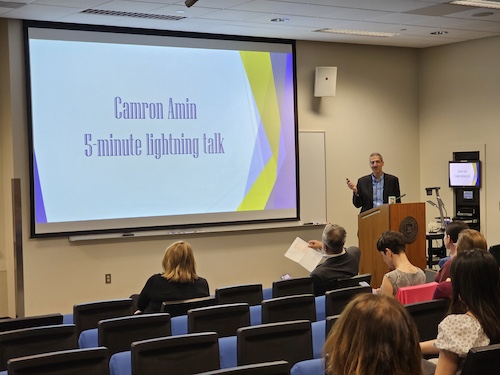
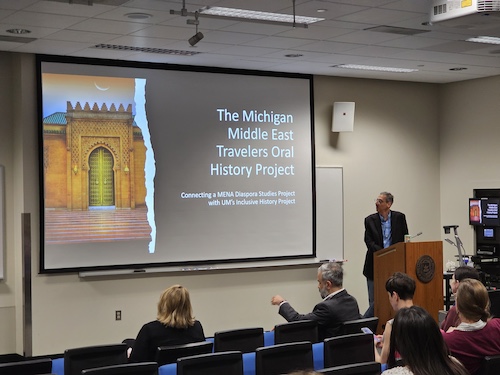
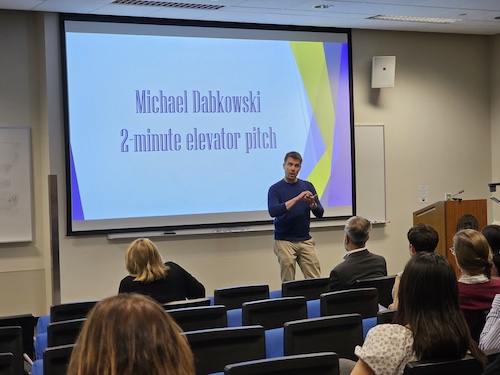
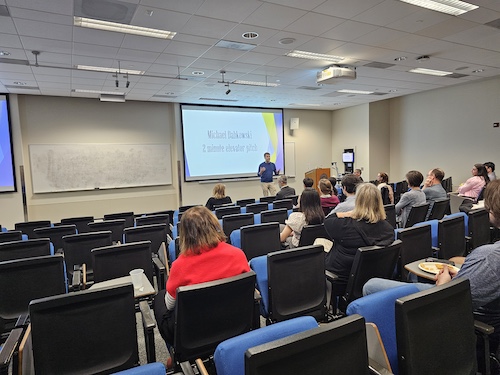
Natural Selection and Tooth Enamel Genes in Lizards
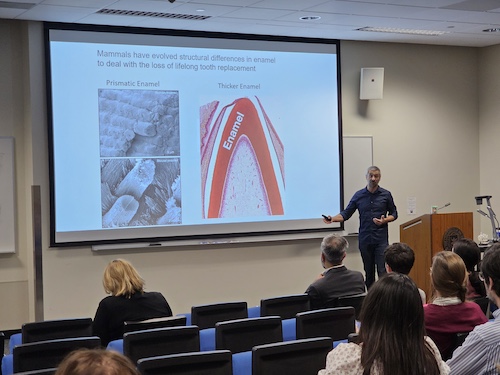
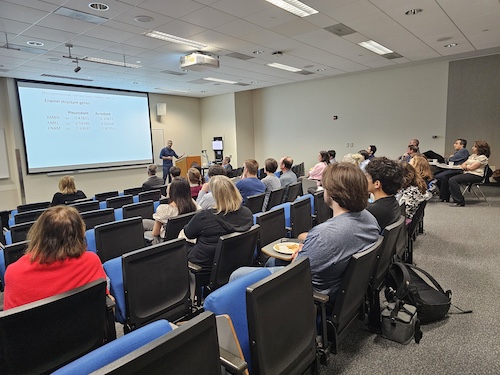
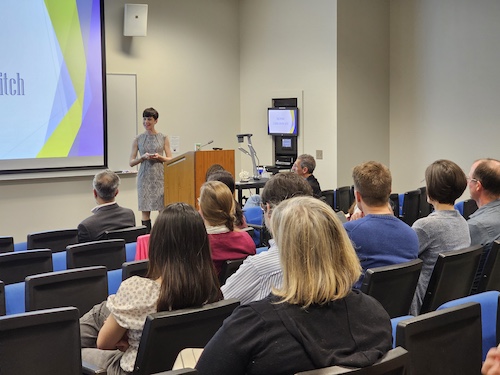
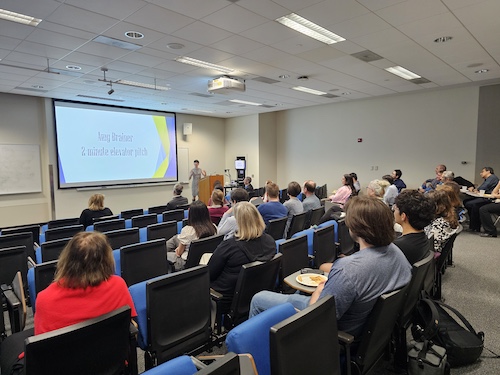
Learning to Distinguish Random Walks with Topology
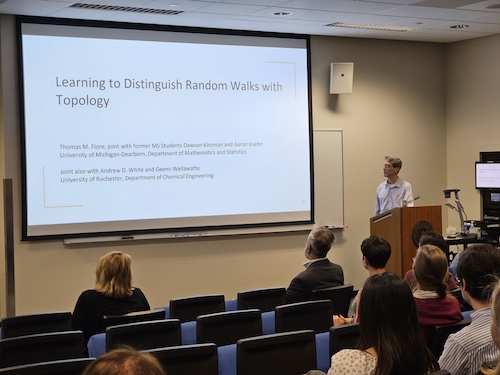
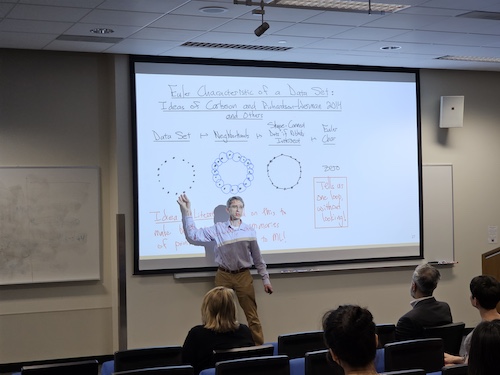
Riboflavin Delivery and Detection: The Role of Hydroxyl Groups on the Ribityl Tail
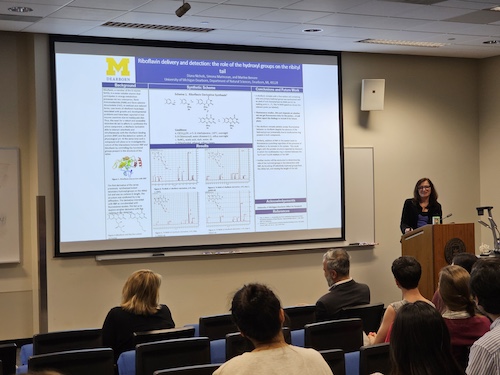
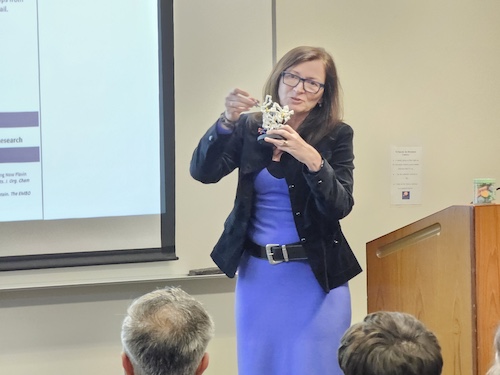
State Telehealth Policy Determinants during the COVID-19 Public Health Emergency
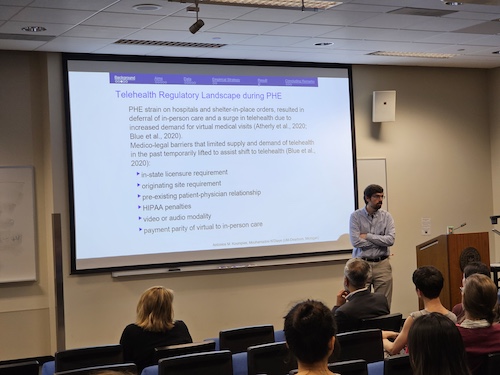
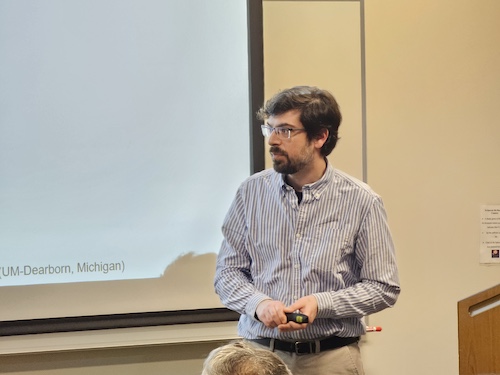
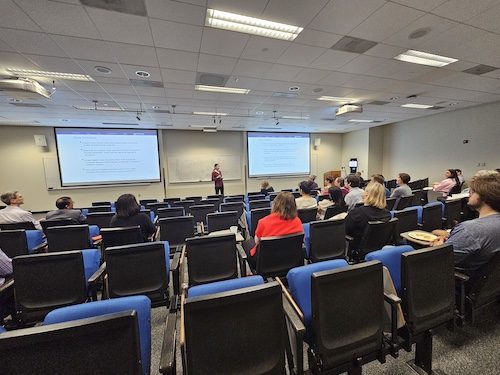
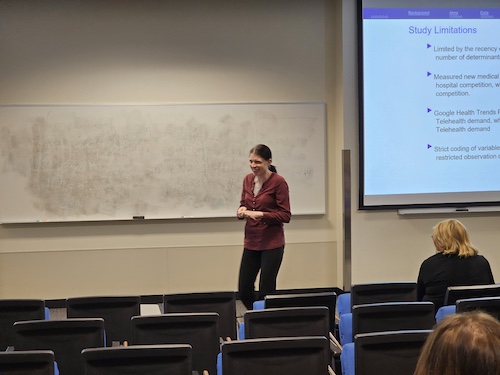
Does Who Impact How? Trying to Enter the PR Field during the Pandemic
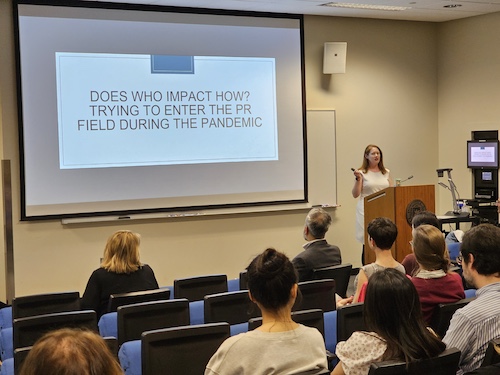
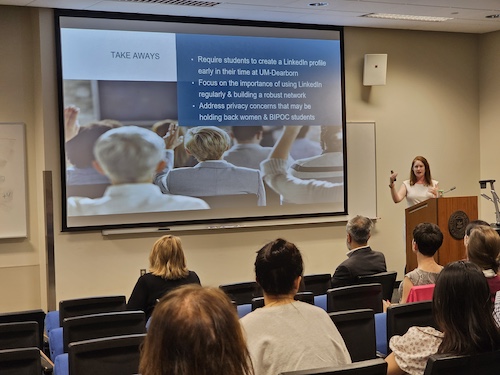
Writing about Boys: Essays on Keeping a Diary, the Efficacy of Ordinary Texts and Synchronicity in Action
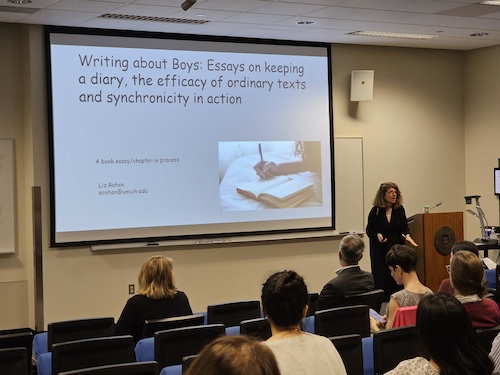
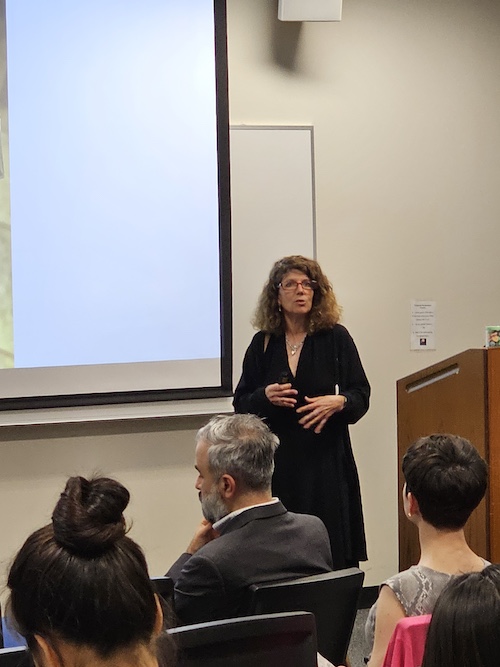
There and Back Again: Primate Journeys in Virtual Space
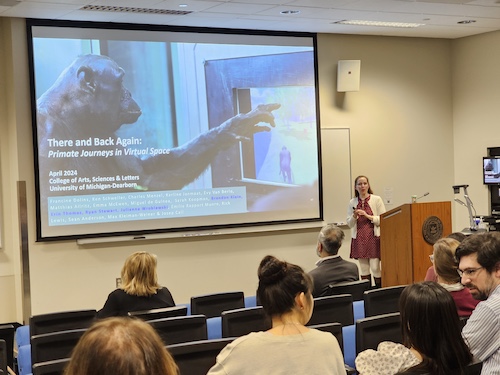
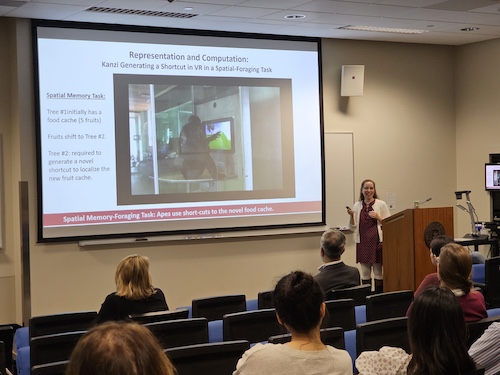
Beleaguered Bladders and Bacterial Battles
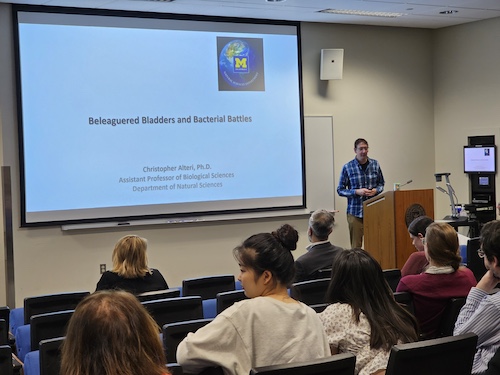
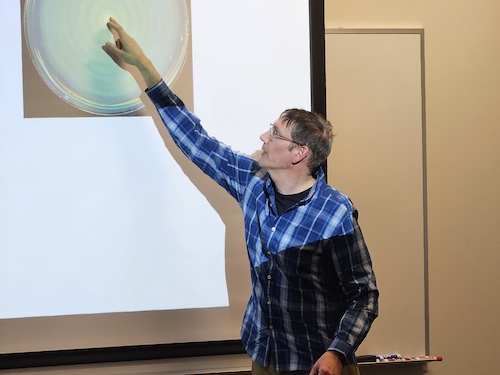
Understanding Fluorene-9-bisphenol (BHPF): The Emerging Substitute for BPA
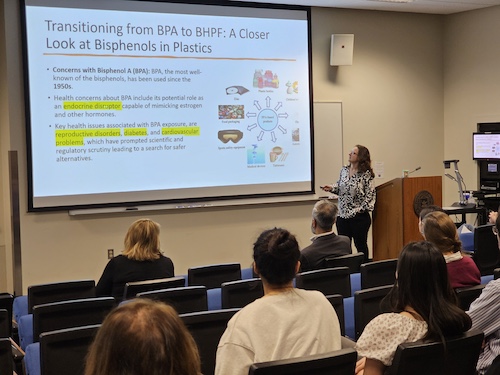
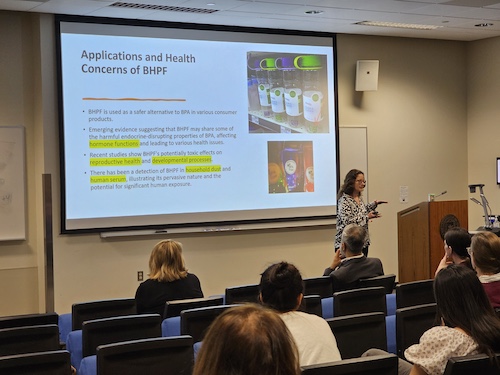
Interpersonal Connections and Health Lab
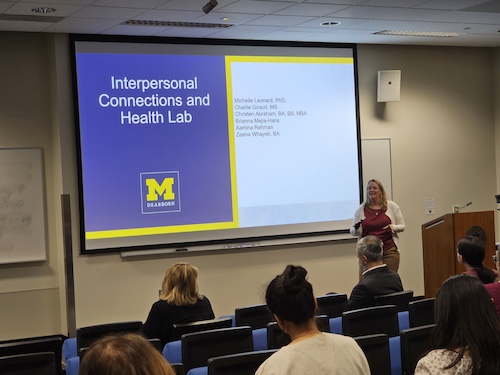
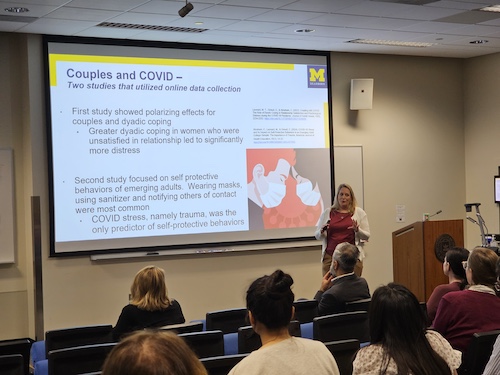
Poster Presenters
- Jie Fan
- Sheila Smith
- Bushra Hussain
- Christos Constantinides
- Shannon Li
- Marilee Benore
- Matthew Heinicke
- Simona Marincean
- Besa Xhabija
Book, Artifact, & Tweet Presenters
- Pam Aronson
- Georgina Hickey
- Francine Banner
- Kathleen Darcy
- Nick Iannarino
- Yunus Zeytuncu
- Adam Sekuler
- Wessam Elmeligi
- Antonios Koumpias
- Caitlin Finlayson
2022 Research Slam
Ten CASL faculty members presented their research at the eighth annual Faculty Research Slam on October 20, 2022.
Below you will find their research abstracts along with some of their presentation recordings.
One of the essential stages of development in all vertebrate embryos is the proper formation of the nose and mouth. Despite the shared need for this process, there are substantial differences in how this occurs in different groups. In mammals and reptiles, outgrowths from the embryonic face fuse together and simultaneously form an open mouth and nasal cavities, creating an interconnected network with the gut. Salamanders and lungfishes also form nasal cavities and a mouth but take a distinct developmental path from other vertebrates. Through the use of microCT analysis, traditional histology, and molecular interference, we were not only able to elucidate the unique formation of these structures, but also gain insights into the underlying genetic mechanisms involved.
More than 1.9 million new cancer cases and 600 thousand cancer deaths are projected to occur in the United States in 2022. The major cause of cancer morbidity and mortality is metastasis, a process in which tumor cells transmigrate across the blood vessel wall into and out of the blood circulation before invading a secondary tissue. Normally, the endothelial cells lining the blood vessel wall form a tight and selectively permeable barrier precisely regulating the passage of substances including gases, nutrients, wastes, and cells. However, the barrier functions can be remarkably damaged in various pathological conditions. Then what is happening to the endothelial barrier during metastasis? In this talk, we will discuss several critical changes in endothelial cells we have found previously and introduce our newest findings on the rightward-handedness of endothelial cells which could be significantly disrupted by malignant tumor cells.
Roughly speaking, the theory of Large Deviations deals with the probabilities of rare events. To understand why rare events are very important in our life, we can think of hitting the jackpot at the casino. That is, a rare event can have an enormous impact on our life if it happens. In general people say the probability of hitting the jackpot is almost zero. Since a rare event still happens, the probability is extremely small, not zero. I will discuss how mathematicians quantify the probability of a rare event. The most active field in probability theory is probably Large Deviation Theory because it has been widely used in various areas, physics, finance, statistical mechanics, insurance, and biology etc. I will introduce some applications of Large Deviation theory.
Assessment growth limits cap the growth of the property tax burden. The accumulated difference between the assessed value and the market value is the assessment growth limit benefit. Overtime, assessment growth limits generate sizable tax benefits to long-time homestead owners but also a lock-in effect in the homestead property. Florida and California permit homestead owners to transfer their accumulated tax benefit from their old homestead to a new homestead, lowering tax assessment and, crucially, the taxes for the new homestead. As a result of the 2008 portability provision in 2008, FL homeowners have greater incentive to move out to a new homestead within the state, relative to homeowners at other states considering relocating in-state. Using 1993-2011 county-to-county IRS migration data, we estimate the impact of property tax assessment limit portability has had on intra-state migration within FL counties relative to county-to-county migration in other states that do not permit portability. Our findings provide evidence that property tax assessment growth limit portability alleviates the lock-in effect of assessment limits and increases in-state out-migration among FL counties relative to counties in the rest of the U.S. Policymakers should consider permitting this flexibility as a measure of population retention of homestead owners for whom voting with their feet in-state is less costly than relocating out-of-state.
To investigate how indicators of psychological stress and physical health differentially influence subjective and objective memory in older adults, we recruited 404 adults (aged 55 and older) from Mturk and remotely assessed their physical health (i.e., multimorbidity, body-mass index), psychological distress (i.e., perceived stress, anxiety, depression), subjective memory complaints, and task-based objective memory performance. We found that both physical health and psychological distress significantly predicted subjective memory complaints, but only physical health was associated with objective memory performance. This result suggests that older adults’ subjective memory measures can be influenced by participants’ psychological profile, whereas remotely administered objective memory tasks are more immune to that. The result also supports previously established links between physical health and objective and subjective memory function.
The United Nations sponsors a program called the UN Global Compact that engages the private sector with human rights goals. My project is looking at the annual reports companies submit to retain membership in this program. In particular, I'll be presenting a rhetorical analysis of BP (British Petroleum) and the trends and contradictions in their reports. My method borrows from the concept of "governmentality," an idea formulated by Foucault and further developed by post-colonial feminist scholars.
My talk is based on my recent work that seeks to understand the Roman public and visual cultures of commemoration through the application of cognitive theories of extended mind, prediction error minimization, and future thinking. I argue that the application of cognitive theories--with the understanding that cognition is a culturally-, historically-, and technologically-mediated phenomenon--allows for a fuller grasp of why static artworks were often paired with reiterative public ceremony, how visual markers such as dress could do more than denote social rank and prestige, and how individuals were able to assert and extend their agency beyond their expected lifetimes through ephemeral benefactions. Through such a methodology, the often assumed and elided processes of thought underlying Roman public monumentality are more brightly illuminated so as to open avenues for the consideration of the intertwined agency of people and object.
This talk will discuss the increasing prominence of philanthropic donors in driving policies and governance in U.S. cities and the implications for revitalization outcomes and local democracy.
A functional transportation system sustains the organization of a city. Similarly, the cellular transportation system maintains the structure, growth and health of a cell. The long distance transportation in a cell is regulated by molecular motor proteins (act as vehicles for cell), microtubule filaments (act as roads in cell) and Adenosine Triphosphate (ATP – the fuel in cell). Together, molecular motor proteins (vehicles) transport cellular organelles (cargos) along the microtubules (road) consuming energy from ATP (fuel). Defects in intracellular transport have been associated with neurodegenerative disease, cancer, diabetes, and degradation of pathogens. Yet, how molecular motor proteins regulate the intracellular transport and how cells regulate the functions of motor proteins are not clearly understood. In this presentation, I will discuss my current work to understand the regulatory mechanisms of molecular motor proteins during the transport of phagosomes in cells.
My research activities are focused on a variety of Quantum and Optical Phenomena. The Quantum part of my research involves studying effects in an atomic or subatomic size with single photon precision. This field of research has the potential to revolutionize how computers work as well as guaranteeing secure communications over arbitrarily long distances. The optical aspect of my research explores using optics to measure distance with nanometer precision and constructing pulsed laser cavities. My research interests have grown over my career to involve other fields such as biology, electronics, engineering, programming, and has strengthened my interest in learning in general.
Fall 2022 Slam Videos
2021 Faculty Research Slam
On October 28, the following faculty discussed their research in seven minute presentation formats. Videos of the talks are posted below.
- Bill DeGenaro (Composition and Rhetoric): The Bad Speller: Error, Satire, and Ridicule
- Michelle Leonard (Psychology): Coupling with COVID
- Elena Zhang (Neurobiology): The temporal and spatial correlation of amyloid-, tau pathology and ER stress in a pediatric traumatic brain injury model
- Deborah Smith Pollard (English Literature and Humanities): All I See Is Your Booty and Cleavage: Sex and the Contemporary Gospel Song
- Jorge Gonzalez del Pozo (Spanish): Spanish Food: The Quest for Identity in a Globalized World
- Ulrich Kamp (Earth and Environment): The Shippee-Johnson Peruvian Expedition of 1931: Mapping Glacier Recession Through the Lens of Repeat Images
- Jamie Wraight (History): Reconstructing Chelmno: An Exercise in Historical Representation and Recreation
- Kriszta Sajber (Philosophy): Patient Autonomy and the Ethics of Vaccination
- Margaret Murray (Communication): Calm in the Store: Emily Oster's Parenting Newsletter during COVID-19
Fall 2021 Slam Videos
2020 Faculty Research Slam
On October 30, the following faculty discussed their research in seven minute presentation formats. Some of the videos of their presentations are posted below
- John Abramyan (biology): Genetic Analysis Reveals Early Tooth Loss in Toads
- Maya Barak (criminal justice): Rethinking Procedural Justice: Hypnobirthing and Immigration Court
- Michael Dabkowski (mathematics): Nonlocal Equations: Understanding Coagulation and Fragmentation of Particle Clusters
- Shelly Jarenski (English literature): "No Such Thing as a Black Cowboy”—Re-capturing Black Cowboy Culture and Black Eco-Critical Consciousness in Shelton Johnson’s Gloryland
- Brian Dates (public administration and policy): The Effect of Transition to Telemental Health on Service Delivery in the Community Mental Health System in Response to SARS-Cov-II
- Georgy Khabarovskiy (French): Ways of Traveling and Knowing in French Women’s Colonial Writings from the Interwar Period
- Maureen Linker (philosophy): What we can learn from an 18th century British Philosopher about Ethical Leadership Today?: Hume on Natural Virtues
- Zhong Xu Liu (psychology): Visual exploration facilitates memory formation: The involvement of the hippocampus
- Kristin Poling (history): How City Walls Fell: Uncovering the Origins of a Modern Myth
- Peter Oelkers (biology and biochemistry): Membranes, the Fabric of Life
- Nadja Rottner (art history): Claes Oldenburg and the Beautiful Schlopp with a Cherry on Top
- Tian An Wong (mathematics): Variations of a parallel search game
Fall 2020 Slam Videos
2019 Faculty Research Slam
Faculty presented in PechaKucha style ... the art of concise presentations, 20 images x 20 seconds ... at the fifth annual Research Slam on November 1, 2019. Click on the faculty member's presentation title for a video display.
- Elena Zhang (NSCI): The impact of pediatric traumatic brain injury on the hippocampal adult neurogenesis and cognitive function
- Cam Amin (SSCI): The MIAOHP and Iranian Diaspora Studies
- Sonia Tiquia-Arashiro (NSCI): The Environmental Dimension of Antibiotic Resistance
- Yunus Zeytuncu (MATH): Solving differential equations in different geometries
- Rusi Sun (SSCI): Integrating, Contending, Yielding or Avoiding? A Study on City Managers’ Choice of Conflict Management Strategies
- Ghassan Abou-Zeineddine (LPA): Voices of Arab Detroit: Narratives of Boundary and Belonging
- Francine Dolins (BSCI): Where the Wild Things Are…and How They Get There: Bonobo, chimpanzee and human navigation in virtual reality (VR)
- John Abramyan (NSCI): Nasal Plugs in Chicken Embryos
- Jamie Shinhee Lee (LCC): Polylingual paronomasia, creative hybridity, and the linguistic landscape
- Kalyan Kondapalli (NSCI): An Inside Job: Role of Endosomal pH Regulation in Brain Cancer
- Pam Aronson (BSCI): Gender Differences in Definitions of Consent and Sexual Assault in the #MeToo Era
- Susan Erickson (LPA): Berthold Laufer in Xi’an, China
